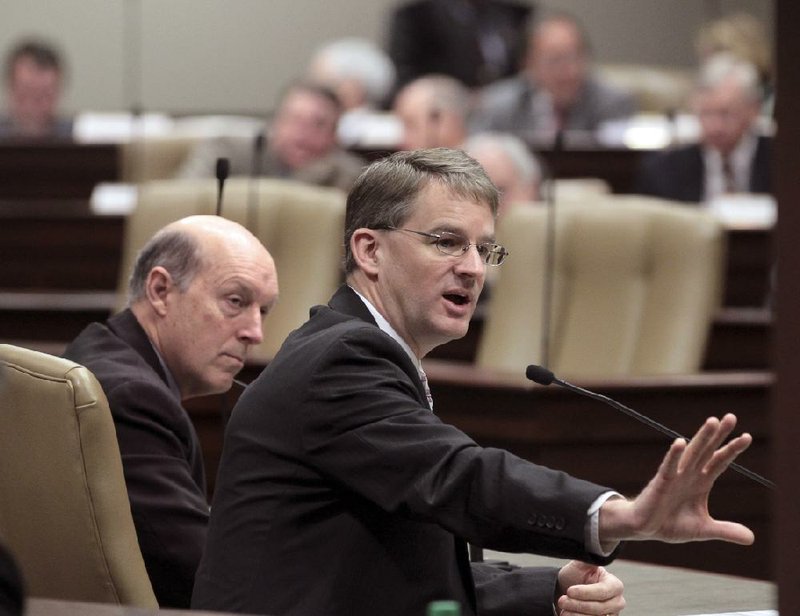Leaders in the state House and Senate say funding the state’s Medicaid expansion program, known as the private option, will dominate debate during the second week of the 89th General Assembly fiscal session, which starts Tuesday.
The first week of the session was spent mostly on negotiations and amendments to the $915 million private-option plan. Supporters need the votes of three-fourths of the membership in both chambers to pass the funding measure.
The private option, which provides federally funded private health insurance for roughly 100,000 Arkansans, narrowly won legislative approval in 2013, the year it was created.
House Speaker Davy Carter, R-Cabot, said late Friday that he expects the House to spend a good bit of time this week debating House Bill 1150, an appropriation measure for the state Department of Human Services’ Medical Services Division. Consideration of that measure is scheduled for Tuesday.
“That’s it. That’s really going to be the only issue that gets debated … not just for this coming week, but for the session as a whole,” he said. “My goal is to pass it, whenever it makes the most sense to do so. Right now, the plan as of today [Friday]is to have that vote Tuesday. But we’ll vote Tuesday and Wednesday and Thursday if we need to.”
Arkansas created the private option after receiving a waiver from President Barack Obama’s administration to use funds provided by the 2010 Patient Protection and Affordable Care Act to expand Medicaid health-care coverage in the state.
The expanded Medicaid extends program eligibility to adults with incomes of up to 138 percent of the poverty level - $15,860 for an individual or $32,500 for a family of four.
In making their case for approving private-option funding, supporters of the program have stressed the adverse effects of dropping the more than 100,000 people newly enrolled in insurance plans. Opponents say, among other things, that the Affordable Care Act will drive up the national debt and that the state can’t afford to pick up 10 percent of the program’s cost, which it will have to do by 2020.
Gov. Mike Beebe has predicted that canceling the program will put an $89 million hole in the state’s proposed $5 billion budget for fiscal 2015. Critics have said they haven’t seen strong evidence that the effect will be that dramatic.
Senate President Pro Tempore Michael Lamoureux,R-Russellville, said the Senate could get its version of the private-option funding bill - Senate Bill 111 - as soon as Wednesday, depending on the House vote.
“We’re going to work on passing other agency budgets and move some other stuff out of the chamber,” he said. “If the private option passed the House without any unforeseen problems, we could get it Wednesday. If we end up not getting the votes, we could end up spending a little more time on that.”
Lamoureux said as far as he knew Friday, nine of the 35 senators are still against funding the program, meaning the bill would be one vote short of the 27 needed for passage.
Senate Majority Leader Sen. Eddie Joe Williams, R-Cabot, said the Senate will likely also take up legislation authorizing the extension of the fiscal session by up to 15 days if needed, as a precautionary measure. The House approved similar legislation last week.
For his part, Williams said he will also work to get a bill through the State Agencies Committee to amend election law. The legislation would give the governor discretion to not hold a special election to fill the office vacated by former Lt. Gov. Mark Darr. Darr resigned as of Feb. 1 after the Arkansas Ethics Commission fined him $11,000 for violating state ethics and campaign-finance laws.
Both chambers passed a resolution last week to support the introduction of the nonappropriations bill during this fiscal session partly, Williams said, because not having to hold a special election to fill the vacancy will save the state as much as $1.3 million.
Joint Budget Committee Co-Chairman Rep. Duncan Baird, R-Lowell, said committee members are going to work this week on reviewing, amending and moving several non-private-option appropriations bills out of the committee and to the House and Senate chambers.
The committee spent most of last week on two compromise amendments to the private-option bill, one that would eliminate spending on advertising, and one that would eliminate the private-option program on Feb. 1, 2015, if the federal government does not approve several waivers.
Baird said he and the other committee members hope to keep things moving in hopes of keeping the session short.
“I think we as a committee are still on schedule, keeping things moving forward and making sure that the members are talking to each other,” he said.
Front Section, Pages 1 on 02/17/2014


